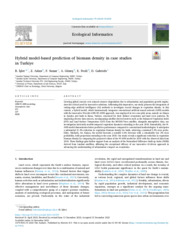Hybrid model-based prediction of biomass density in case studies in Turkiye
-
Yazar
Buket İşler
-
Tür
Makale
- Yayın Yılı 2024
- Veritabanları Wos,Scopus
- DOI 10.1016/j.ecoinf.2023.102439
-
Yayıncı
Elsevier B.V.
- Dergi Ecological Informatics 79,
- Tek Biçim Adres https://hdl.handle.net/20.500.14081/2009
-
Konu Başlıkları
ANN/W-ANN modelling
Atmospheric data
EVI
LST
NDBI
Growing global concern over natural resource degradation due to urbanisation and population growth emphasizes the critical need for innovative solutions. Addressing this imperative, our study pioneers the integration of cutting-edge artificial intelligence (AI) methods to investigate crucial changes in vegetation density. In this context, a hybrid model, which harmoniously integrates conventional artificial neural network (ANN) models with the innovative Wavelet-ANN (W-ANN) approach, was employed in two case pilot areas, namely on Alanya in Antalya and Iznik in Bursa, Turkiye, renowned for their distinct ecosystems and land cover patterns. By employing diverse data sources, encompassing satellite-derived metrics such as the Enhanced Vegetation Index (EVI) and Land Surface Temperature (LST) from the MODIS/Terra satellite, alongside atmospheric data, our investigation intricately models temporal vegetation dynamics extending to the year 2030. Remarkably, the W-ANN model demonstrates better predictive performance compared to conventional methodologies. It anticipates a substantial 21.4% reduction in vegetation biomass density for Iznik, achieving a minimal 5.4% error probability. Similarly, for Alanya, the model forecasts a notable 6.6% decrease with a remarkably low 2% error probability, both projections extending to the year 2030. Our study reveals a significant reduction in vegetation biomass density by comparing the projected values of the W-ANN model for 2030 with the observed data from 2018. These findings gain further support from an analysis of the Normalised Difference Built-up Index (NDBI) derived from Landsat satellites, affirming the exceptional efficacy of our innovative AI-driven approach in advancing the understanding of urbanisation's impact on ecosystems. © 2023
-
Koleksiyonlar
Fakülteler
Mühendislik Fakültesi


 Tam Metin
Tam Metin

